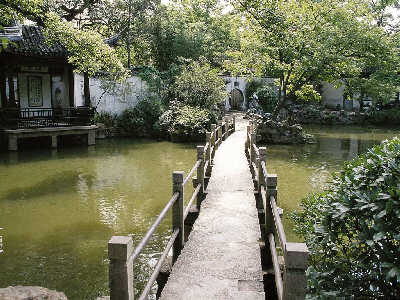
On the other hand, Taoism worships nature. It holds that supernatural beings do exist. Accordingly, gardens with a fairyland as the design theme emerged. It was recorded that Shanglin Garden, built for the first emperor of theQin Dynasty(221-206BC), had already employed the layout of "one lake, three hills" -- a lake surrounded by hills. Since then the layout of "one lake, three hills" was widely used in designing gardens for the royal family, and later for ordinary people.
For instance, there used to be a "Lesser Square Kettle Garden" inYangzhou, while there is a "LesserPenglai" in Liu Garden in Suzhou and "Lesser Yinzhou" in theWest LakeinHangzhou. (Square Kettle Garden, Penglai, and Yinzhou are all imaginary places inhabited by the immortal.)
The Chan Sect of Buddhism and Chinese Garden
Incorporating original thoughts of Indian Buddhism with Chinese thoughts about life, the Chan Sect is regarded as a localized religion in China. It holds that intuition, experience, or meditation, rather than logical analysis, is the proper and effective way to understand the world. Human beings and the universe should co-exist in union.
In theTang Dynasty(618-907) the Chan Sect has become a prominent religion. Since then, the inner feeling, intuition, and meditation have become important in artistic undertakings. Garden design was no exception. According to the Chan Sect, everything in the world can reflect the power of Buddha. Therefore, no matter how small a garden may be, it is a mirror of the natural beauty. Unlike its counterparts for the royal family, literati gardens full of Buddhist taste tend to be smaller in size and scale.
The development of classic Chinese gardens clearly shows that cultural philosophies have played an indispensable part in garden design. Not confining itself to visual satisfaction through inviting shapes or colors, Chinese garden tends to convey the meaning of life and the idea that human beings should co-exist with, rather than conquer, the nature.
(Source: chinaculture.org)

Copyright ©1999-2011 Chinanews.com. All rights reserved.
Reproduction in whole or in part without permission is prohibited.